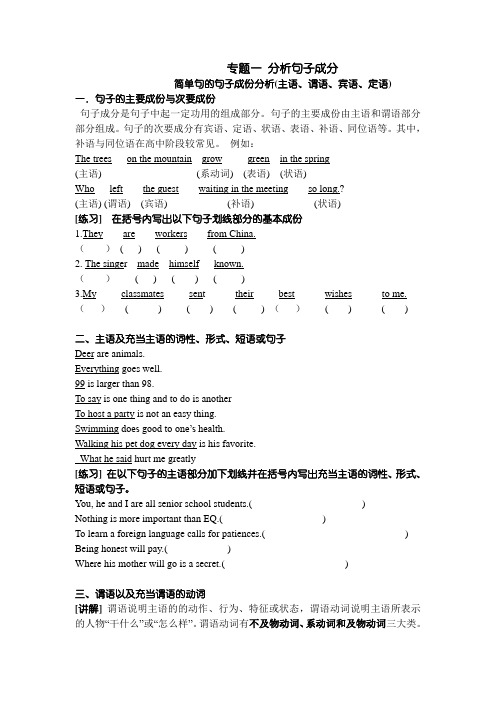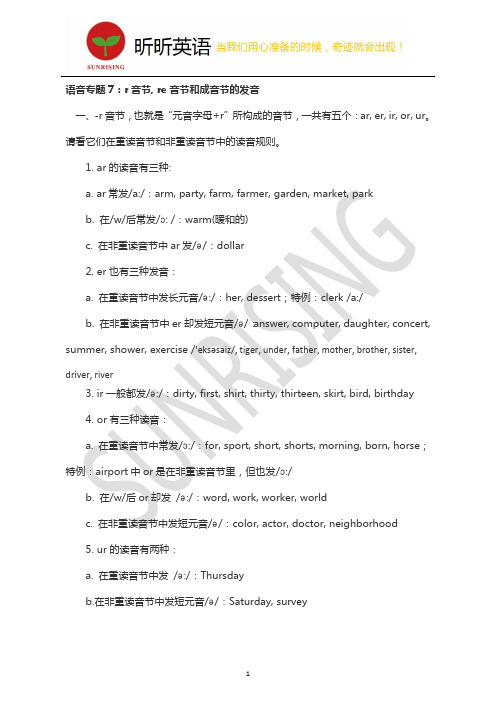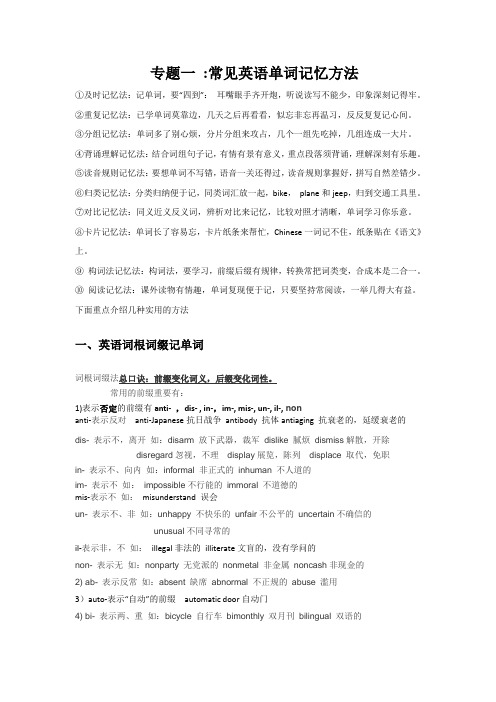专题一RE
小学英语语法 否定句专题一

规则:1、有be 动词(is、am、are)、情态动词(can、would)的情况下,直接在be 动词、情态动词后面加not,其他按原位置照抄;注意一:注意二:找be动词时也要注意缩写和完全形式:she’s = she is ,he’s = he is, it’s = it is, I’m = I am ,they’re = they are2、无be动词、情态动词,在实义动词前加don’t.其他按原位置照抄;3、祈使句(动词在句首的句子),在实义动词前加Don’t(在句首要大写).其他按原位置照抄;做题时,请先圈出be动词,情态动词和实义动词。
4、否定句some变any;练习:一、将下列句子改为否定句。
1.This is the reading room. This_______the reading room.2.She’s Miss Li.She _________ Miss Li.3.I am in Grade3.________ _________ in Grade3.4.Miss Zhang is our English teacher.______________________________________5.We are teachers. We_________ teachers.6.These are pears._____________________________________________________7.She is a nice girl.____________________________________________________8.I can draw a toy car. ______ _______ _______draw a toy car.9.Your mother can draw a red coat._______mother ________draw a red coat.10.The boy can get some grapes._________________________________________11.The children can read books.__________________________________________12.I can dance.________________________________________________________13、I have a lot of toys._________________________________________________14、There is a boy in front of the classroom._____________________________________________________________________ 15、They play basketball together on Sunday._____________________________________________________________________16、Look at the book, please. __________ _________ look at the book.17、I want to talk. I ________ __________ to talk.18、Look at my schoolbag. _______ _________ my schoolbag.19、We like this kite. We ________ ________ this kite.20、I like tomatoes. I _________ _________ tomatoes.。
高三英语二轮复习专题一 强化练(七)

强化练(七)主旨大意题(2)Ⅰ.阅读理解A(2023·浙江五校联考)On Mondays, two of my children get ready for school in an unusual way.Each packs plenty of food and water, a pair of rubber boots and sometimes a cup of hot chocolate.Then, I drop them off at a nearby park where they spend the entire day outside at a certified forest school.When I first let them sign up for the forest school program,I loved the idea, but as a mum,I was concerned about a few things: Would they be comfortable outside for that long? Would they stay engaged for that many hours? Then I asked them if time ever seemed to move slowly,they stared at me in confusion.They didn't understand my question, which fittingly removed my concern.In this program, kids direct their own play,climbing tall trees or testing ice on the frozen lake.They are never told their play is too high or too sharp, but are rather trusted toself-adjust.Something else my sons appreciate about the forest school is not being told to move on to the next activity, but being left to stay in a particular spot for as long as their curiosity allows.“What about all the things they're missing in real school?”concerned parents have asked me.Neither of their classroom teachers thinks it's a problem, but most significantly, my kids are learning new and different skills that a classroom cannot teach.They are learning to sit silently and observe nature up close—a skill that's virtually impossible to develop in a noisy and overcrowded classroom setting.They are making social connections across a broader range of age groups.They cooperate together, using their different sizes and strengths to fulfill various roles within their games.I appreciate it that the forest school is shaping my boys' relationship with theoutdoors.They're learning how to spend extended periods of time in nature, what to do to pass the time,and developing knowledge that will get them much closer to nature in the coming decades.1.What is special about the forest school program?A.Teachers engage in kids' play.B.Kids play and learn outdoors.C.It focuses on nature protection.D.It offers various foods and drinks.2.How did the author feel about kids' reaction to her question?A.Awkward. B.Concerned.C.Relieved. D.Proud.3.What does Paragraph 4 mainly talk about?A.The concerns caused by the program.B.The benefits gained from role-play.C.The skills acquired by children.D.The games loved by teachers.4.What can be a suitable title for the text?A.Nature:a Wonderland for the YoungB.The Forest School Program Proves a HitC.Parks Are Replacing Traditional SchoolsD.Forest School:a Fine Place for My Kids[语篇解读]本文主要讲述了作者的两个儿子在森林学校项目中的收获以及该项目的好处。
专题一情景对话及答案

情景交际专项训练(( ( ( ( (( ( ( ( ( ( ( ( ((一)根据对话情景,选择最佳答案。
)1. ---- I haven ' t seen Jack for three days. Is he ill? ----_________ . His mother told me that he was in hospital.A. I am afraid soB. I hope notC. I don ' t expectD. I am afraid not)2.—— If you have any trouble, be sure to call me.A. I am sorry to hear thatB. I will. Thank you very muchC. I have no troubleD. I will thi nk it over)3. ---- Turn on the radio._ ?---I asked you to turn on the radio.A. Excuse meB. SorryC. Don ' t youD. Pardon)4. ---- Do you thi nk the rain will stop tomorrow?---- _______ . It has rained for half a mon th. It ' s twet.A. I hope thatB. I ' m sure it willC. I ' m afraid it willD. I hope so)5. --- Excuse me . Which is the way to the post office?---Sorry. I ' m new here.A. I thi nk soC. That ' s trueB. Bad luckD. Thank you all the same)6. -Your dress is just won derful!A. You are right, tha nk you.C. No, no, yours is best)7. -Excuse me! -- ___A. WhoB. What—B. Thank you, and youD. Thank you. I ' m glad to hear that ?-- Are you Mr. Smith?C. YesD. Me)8. - I ' ve got an offer in NeYork.-Oh, _______ ! But I ' m going to miss you.A. th at ' s too badB. I ' m sorryC. I beg your pardonD. that ' s great)9. -Tha nk you ever so much for prese nt you sent me.A. Please don ' t say soB. It ' ssoogood, I thinkC. No, thanksD. I ' m glad you like it)10. - Aren ' t you tired, Kate?-- _____ . I like going shopp ing.A. Not at allB. I ' m so sorryC. You ' re welcomeD. Yes, of course )11. -Happy birthday to you!-- !A. Happy birthday to youB. I ' very gladC. That ' s all righD. Thank you )12. - have passed the English exam.-- ______ . Con gratulati ons!A. SorryB. Bad luckC. Come onD. Well done)13. - You' ve given us a wonderful Chinese dinner, Mrs Huang.A. Oh, I ' m afraid I didn ' t cooB .well' m glad you enjoyed itC. It ' s not necessary for you to say soD. It doesn ' t matter )14. -Could you come, please? I want some help.A. Sure. I ' m coming now You )15.-How is the weather today?--It ' s _______ .A.sunnyB. Sundayre welcome C. Yes, I couldD. ThatC.June 26D. Seven o clocks rightA. Oh, what a pityC. You can caII me John)2. --- May I use your dictionary? B. You are poIite D. It ' s my pIeasureA. Of course not C. N o, I don 't mindB. Sure, here you are D. It doesn 't matter( )16. -Can you stay here Ion ger?-- ______ , but I have to be back tomorrow.A. No probIemB. I 'm afraid notC. I 'd Iove toD. No, thank you ( ) 17. -Have a good journey home, David.A. Thank youB. What a pityC. WeII downD. You 'd better not taIk( ) 18. -HeIIo. May I speak to Mike?-- ______ . PIease caII back Iater.A. Wait a minuteB. HoId on for a momentC. SpeakingD. Sorry, he is out ( ) 19. -ShaII we go skating tomorrow?A. You are aII rightB. It 's very kind of youC. You 're rightD. That 's a good idea ( ) 20. -- , pIease?-- I think it 's about 5:30.A. What day is itB. What 's the dateC. Where 's your watchD. What 's the time(二)( )1. ------- ______ ?--- Go aIong this road. It 's about fifty metrfreosmawthaeybookshop.A. Where 's the bookshopB. Excuse me, how can I get to the hospitaIC. Excuse me, is this way to the bookshopD. How do you go to the hospitaI ( )2. I Iost my waIIet on my way to schooI this morning.--- _______ ! You must be carefuI next time.A. Take careB. Excuse meC. What a pityD. You ' re weIcome ( )3. ?--- Sorry, he has gone to Japan. But he wiII be back in two days.A. Who is JackB. May I speak to JackC. How is Jack todayD. What ' s wrong with Jack( )4. --- Sorry, I didn 't return your book on time.A. I agree with youB. It doesn 't matterC. You 're weIcomeD. That 's a good idea( )5. --- HeIIo! May I speak to Henry, pIease?--- Sorry, he isn 't here at the moment. ___________A. Can I take a message?B. I wiII caII you back.C. You have the wrong number .D. HoId on for a moment.(三))1. --- CouId I have your name pIease, sir?)3. --- ShaII we go to visit the Museum of NaturaI History first?A. Yes, we doB. Good ideaC. No, you shan 'D.t It ' s a pity( )4. --- CouId you answer this question, pIease?A. I couIdB. Yes, I couIdn C'. N t ever mind D. WeII, Iet me try( )5. --- WouId you mind opening the window?A. Of course not. Do pIease.B. Ok. Do as you Iike.C. That 's aII right.D. Yes, pIease.(四)( )1. --- What ' s your brother like after he lived in America for about two years?A. He likes America very much.B. He' d like to stay with us.C. He told us many funny stories.D. He isn 'etsthame as he used to be. ( )2.---Is Mr. Smith really very ill?--- ________________ . He ' s in hospital.A. I don ' t think so.B. No, he isn ' t.C. I hope so.D. I ' m afraid so. ( )3.---Sorry, mummy. I can 't tie my shoe.--- Don't worry, dear. ____________ .A.I want to help youB. I ' ll help youC. I ' d like to help you.D. I wish to help you.( ) 4.--- Could you look after my garden while I ' m away?A. With pleasureB. Hold on, please.C. I agree with you.D. That ' s a good idea.( ) 5.--- I ' m going to Hawaii with my aunt this month for my holiday.--- ________________ !A. Have a good timeB. Best wishes to youC. CongratulationsD. Please go(五)( )1.---Good luck and have a nice weekend.--- ______________ . Bye-bye.A. The same to you.B. You have it tooC. You are tooD. The same as you ( )2.---Thank you ever so much for the present you sent me.A. Please don ' t say so.B. It ' s not so good, I think.C. No, thanksD. I ' m glad you like it( )3. ---What a nice meal! Thank you for having us.A. It doesn ' t matterB. It ' s a pleasureC. Not nice enoughD. With pleasure( )4.---What shall I call you, James or Jim?--- __________________ . Either will be OK if you wish.A. I don ' t mindB. It ' s nothingC. Let me seeD. You ' re welcome( )5.---What does the man talking with your headmaster do?--- ___________________ , I think.A. He ' s a busy manB. He ' s a business manC. He looks busyD. He keeps busy(六)( )1. .--- Don' t pick any flowers in the school garden next time, LiLi.A. I have no idea.B. Sorry, I won ' tC. Is that so?D. Don ' t worry( )2.--- If you ' re not going to do anything tonight, How about going out for dinner this evening?A. That ' s rightB. You are welcomeC. I ' m afraid I can ' tD. That ' s all right( )3. .--- Let ' s go hiking on our field trip next Sunday.--- _______________ , but I think I ' m catching a cold.A. Yes, let ' s goB. Certainly. I ' d like to go hikingC. No, I won ' tD. I don ' t need the exercise( )4. ---How are you feeling today? Is there anything better?--- ________________ , I 'm afraid.A. Yes, it fi'nesB. Yes, a bit finer.C. No, even betterD. No, just as usual. ( )5.---Is Mrs Black in?---No, she is out._________________ ?---No, thank you.A. What ' s the matterB. Can I take a message for herC. Can I hold on a momentD. When will you call her back(七)( )1. ---Would you mind my smoking here?A. Yes, never mindB. Yes, you ' d better notC. Yes, of course notD. You ' re unlucky( )2. ---I ' m really glad to have youlal here. ______________ .---Thank you for your nice food, Mrs. Hunt.A. Take it easyB. Please don ' t worryC. Please help yourselvesD. Please help yourself( )3.---Shall we go to visit the Museum of Natural History first?A. yes, we doB. Yes! Let ' s goC. No, you hasn 'Dt. It ' s a pity.( )4. ---What about going to the cinema with me this evening?A. Yes, I think soB. OK, I ' d like to.C. Yes, please.D. That ' s all right. I must go.( ) 5.--- It ' s very hot here. ________________---Of course.---Thank you.A. What ' s the weather like today?B. Could you open the window?C. How old are you?D. Where are you from?(八)( )1.---I feel really hungry. Have you got anything to eat?---Yes, please.A. Do you like these flowers?B. Why not?C. What are you doing?D. Would you like some cake?( )2.---What are your plans for the summer?---Oh, it must be very exciting.A. I ' m going to spend a month in the mountains.B. You ' re wrong.C.I won ' t seyeou then.D. I ' ve been to the Great Wall.( )3.--- I ' ve got to see the dentist. _____________---Have you brought a note from your parents?---Yes.---Can I have a look at it?A. Shall I leave school early?B. Do you like shopping?C. What ' s wrong with you?D. Must I have breakfast early?( )4. --- ________________ the book I wanted you to read?--- It ' s very useful to me. A. What to do with B. What do you think ofD. Take your time, see you 16—20 CADDD C. How about D. How do you think( )5. As you're leaving a shop , the assistant says, “Have a nice day!You say _______ .A. Thank you. Same to you. ByeB. Congratulations to youC. No, thanks. I've made other plans参考答案 情景交际一) 1-5 ABDDD6—10 DCDDA 二) BCBBA(三) C BBDA 四) DDBAA(五) A DBAB 六) BCBDB(七) BCBBB 八) DAABA11—15 DDBAA。
高考英语专题一分析句子成分分析

专题一分析句子成分简单句的句子成份分析(主语、谓语、宾语、定语)一.句子的主要成份与次要成份句子成分是句子中起一定功用的组成部分。
句子的主要成份由主语和谓语部分部分组成。
句子的次要成分有宾语、定语、状语、表语、补语、同位语等。
其中,补语与同位语在高中阶段较常见。
例如:The trees on the mountain grow green in the spring(主语) (系动词) (表语) (状语)Who left the guest waiting in the meeting so long.?(主语) (谓语) (宾语) (补语) (状语)[练习] 在括号内写出以下句子划线部分的基本成份1.They are workers from China.()( ) ( ) ( )2. The singer made himself known.()( ) ( ) ( )3.My classmates sent their best wishes to me. ()( ) ( ) ( ) ()( ) ( )二、主语及充当主语的词性、形式、短语或句子Deer are animals.Everything goes well.99 is larger than 98.To say is one thing and to do is anotherTo host a party is not an easy thing.Swimming does good to one’s health.Walking his pet dog every day is his favorite.What he said hurt me greatly[练习] 在以下句子的主语部分加下划线并在括号内写出充当主语的词性、形式、短语或句子。
You, he and I are all senior school students.( )Nothing is more important than EQ.( )To learn a foreign language calls for patiences.( ) Being honest will pay.( )Where his mother will go is a secret.( )三、谓语以及充当谓语的动词[讲解]谓语说明主语的的动作、行为、特征或状态,谓语动词说明主语所表示的人物“干什么”或“怎么样”。
2023届高考英语复习专题专题一_阅读理解课件

● (2021·新高考Ⅰ卷,A篇)Rome can be pricey for travelers, which is why many choose to stay in a hostel ( 旅 社 ).The hostels in Rome offer a bed in a dorm room for around $25 a night, and for that, you’ll often get to stay in a central location (位置) with security and comfort.
● (全国Ⅰ卷,A篇)Capital City Bike Tour in Washington, DC
● Duration: 3 hours
● Morning or Afternoon, this bike tour is the perfect tour for DC newcomers and locals looking to experience Washington, DC in a healthy way with minimum effort. Knowledgeable guides will entertain you with the most interesting stories about Presidents, Congress, memorials, and parks. Comfortable bikes and a smooth tour route (路线) make cycling between the sites fun and relaxing.
● What will you do on the Capital City Bike Tour? ● A.Meet famous people. ● B.Go to a national park. ● C.Visit well-known museums. ● D.Enjoy interesting stories.
人教版高考英语一轮总复习 语法专题 专题一 第3讲 情态动词和虚拟语气

——我可以把这本书带出阅览室吗?
——不,不能。你只能在这里阅读。为u示:sNt用必o,.于要..n疑性eed问,意n’句为t时/“d必,o其n须’否”t。定ha当回ve答to。————MY——eu我是s,syt必 的oIu须 ,g必miv戒须ues烟ut。p./吗N/s不mo?,o,y你koiun不gn?必ee。dn’t.
It’s surprising that Mary should love such a
意为“竟然”(含惊讶意味)。person as Jack.
玛丽竟然爱上像杰克这样的人,真是让人惊讶。
(6)will和would的用法
用法
例句
表示意志或意愿。will指现在,would He will/would take you home.
小题快练 用适当的情态动词填空
1.—Excuse me,do you mind if I open the window?
—Well,if you must .I can put on more clothes.
解析 考查情态动词。句意:“不好意思,你介意我把窗户打开吗?”“好吧,如
果你一定要这么做的话。我可以多穿点衣服。”must表示“偏要,非要”。
—Must you interrupt now?Can’t you see
I’m on the phone?
表示偏执、固执,意为“非得;偏 —Sorry sir,but it’s urgent.
要”。
——你现在必须打断我吗?你没看见我在
打电话吗? ——对不起,先生,我有急事。
(4)shall的用法
第3讲 情态动词和虚拟语气
专题一
英语
内容索引
情境导入 考点解读 技法图解
最新人教版中考英语词汇复习——专题一 动词 感官动词与实义动词(第一组)

返回目录
感官动词与实义动词(第一组)
46. __c_o_m_m__u_n_i_c_a_te__交流;沟通 ★__c_o_m__m_u_n_i_c_a_t_e_w_i_t_h_s_b_.__和某人交流 47. _c_o_m__p_a_r_e_比较 ★__co_m__p_a_r_e_.._.w__it_h___和……比较 48. _c_o_m__p_le_t_e_完成;结束 49. _c_o_n_n_e_c_t_(使)连接;与……有联系;联结 ★__c_o_n_n_e_c_t_._.._w__it_h_._..__把……和……连接或联系起来 50. __c_o_n_s_id_e_r__注视;仔细考虑;认为;觉得
返回目录
感官动词与实义动词(第一组)
返回目录
29. __b_u_r_n___着火;燃烧;烧伤;烫伤 30. ___b_u_y___购买;买 31. ___c_a_ll___(给……)打电话 ★_c_a_l_l _sb_.__b_a_c_k_给某人回电话 32. __c_a_n_c_el__取消;终止 33. ___c_a_r_e__在意;担忧;关心;照料;保护;小心 ★__c_a_r_e_a_b_o_u_t__关心;在意 34. __c_a_r_r_y__拿;提;扛;携带;搬运;传播;承担(责任);承受(后果)
返回目录
感官动词与实义动词(第一组)
51. _c_o_n_t_i_n_u_e_持续;继续存在;继续;延续 ★__co_n__ti_n_u_e_t_o__d_o_s_t_h_. __继续做某事(另一件事) ★__co_n__ti_n_u_e_d__o_in_g__st_h_.__继续做某事(同一件事) 52. _c_o_n_t_r_o_l_限制;控制;支配 53. ___c_oo_k___做饭(2020.78) 54. ___c_o_p_y__抄袭;模仿;复制 55. ___c_os_t___花费 56. __c_o_u_g_h__咳嗽
高考英语一轮总复习 语法专题突破 专题一 名词、数词、形容词、副词

8.(2017·浙江卷)Sixteen years earlier (early),Pahlsson had removed the diamond ring to cook a meal.When she wanted to put the ring back on later,it was gone.
may be affordable but doing this most days adds up.There could be an even higher (high) cost on your health.
7.(2017·全国Ⅰ卷)Even worse (bad),the amount of fast food that people eat goes up.
7.(2018·全国Ⅰ卷)Two of the authors of the review also made a study published in 2014 that showed a mere five to 10 minutes a day of running reduced the risk of heart disease and early deaths from all __c_au_s_e_s___ (cause). 8.(2018·浙江卷)Few people I know seem to have much desire or time to cook.Making Chinese dishes (dish) is seen as especially troublesome.
◆名词之间的转换 9.(2018·全国Ⅲ卷)My name is Mireya Mayor.I’m a who studies animals such as apes and monkeys.
2024年高考英语新课标卷真题深度解析与考后提升:专题1 2024年新课标I卷听力解读

《2024年英语新课标卷真题深度解析与考后提升》专题01 2024年新课标I卷听力解读养成良好的答题习惯,是决定成败的决定性因素之一。
做题前,要认真阅读题目要求、题干和选项,并对答案内容作出合理预测;答题时,切忌跟着感觉走,最好按照题目序号来做,不会的或存在疑问的,要做好标记,要善于发现,找到题目的题眼所在,规范答题,书写工整;答题完毕时,要认真检查,查漏补缺,纠正错误。
一、总时长:23分28秒二、试音时长:1. 从开头标题考试到试音部分结束是2分17秒(试音英文部分1分23秒)。
2. 第一部分:第一节的题干“请看听力部分第一节......”起读到第二节题干“......第二节到此结束”一共是18分39秒(包括题干、阅题、答题、提示音时间)。
.3. 结束部分:最后“两分钟”是将答案转涂到答题卡上的时间。
三、总词数:共925个四、外教口音:1. 男女主播均为标准美式口音;2. Text10由男主播读两遍,而非男女各读一遍。
五、朗读语速:1.平均语速约为154/WPM2. 按每分钟朗读词数计算即words per minute,简称WPM六、制作格式:1. 国家高考标准格式。
2. 不读小标题Text,从打点开始。
沿用以往“叮咚”打点声。
3. 题干由男生朗读。
4. 涉及两个题号的,用“和”来描述,如:听下面一段对话,回答第6和第7两个小题,现在,你有10秒钟的时间阅读这两个小题。
5. 涉及两个以上题号的,用“至”来描述,如:听下面一段对话,回答第8至第10三个小题,现在,你有15秒钟的时间阅读这三个小题。
七、话题分析: 围绕高中新课标话题及主题语境设计段落话题轮数词数用时语速Text 1 感谢与告别 2 41 17”144词/分Text 2 回忆婚礼时播放的歌曲 1 28 14”120词/分Text 3 为朋友没来艺术展而感到遗憾 1 28 12”140词/分Text 4 变更家具送货的安排 2 33 12”165词/分Text 5 赶火车误点,咨询下一列火车 2 34 14”145词/分Text 6 极端天气的风险和应对措施 4.5 90 40”135词/分Text 7 朋友间分享生活和家人近况 4 143 54”165词/分Text 8 上学方式的变化与影响 2.5 163 59”165词/分Text 9 讨论园艺爱好种植蔬菜和社交媒体分享 4 200 1’15”160词/分Text 10 介绍体育作家生平和成就136 57”143词/分八、题型设置:1. 第一节:短对话2. 第二节:题型:Texts 6-9为长对话,Text10为独白3. 第一节与新高考全国卷Ⅰ、Ⅱ题型设计完全相同(均为短对话)。
外研版高考英语一轮总复习 语法专题 专题一 考点达标检测

5.
(accept) you for who you 6.
3.We have been planning (plan) this for two months now. 解析 考查时态。句意:我们已经计划这个两个月了。本句用现在完成进行 时,表示某动作从过去某个时间开始,一直延续到现在,并且还有可能持续 下去。故填have been planning。 4.“Tonight we have raised roughly $3,000 in profit,which means over 1,000 children can get the education they deserve,” he said.“ Without you,tonight would not have been possible.”
2.In time when our interactions with others and the large amount of information we take in are (be)all too transient(转瞬即逝的),perhaps it is worth making more time for reading out loud. 解析 考查动词时态和主谓一致。句意:当我们与他人的互动和我们接收到 的大量信息都太过短暂时,也许值得花更多的时间大声朗读。此处陈述客 观事实,使用一般现在时,主语为interactions和the large amount of information,谓语动词使用复数形式。故填are。
解析 考查虚拟语气。本句考查介词without引导的与现在事实相反的虚拟 语气。故填Without。
5.Both headlines were put (put) forward by a major new study into diet and health outcomes.
2020年小升初六年级英语语音专项考点精讲+典题突破 专题05《“r re+元音”型连读》(通用版含答案)

小升初英语语音专项透析专题05《“r/re+元音”型连读》(考点精讲+典题突破)【考点精讲】“r/re+元音”型连读在短语或句子中,前一词以-r或-re结尾,后一词以元音开头时,可将/r/与后面的元音拼读。
如:They looked for it here and there.这个句子也有两处连读:前一处是for it合读为/frit/,后一处是here and合读为/hirnd/。
They’re my father~and mother.I looked for~it here~and there.There~is a football under~it.There~are some books on the desk.Here~is a letter for you.Here~are four~eggs.But where~is my cup?Where~are your brother~and sister?但是,如果一个音节的前后都有字母r,即使后面的词以元音开头,也不能连读。
The black clouds are coming nearer and nearer.(nearer与and不可连读)【典题突破】一、阅读理解。
1.阅读短文,选择正确的答案。
My name is Li Mei. I'm 13 years. There are three people in my family. They are my father, my mother and me. My father is a farmer. In the past, he got the crops in by hand. Now he uses a machine. It can get the crops in very quickly. It can save a lot of time. My mother is a street cleaner. In the past, she swept the streets with a broom. Now she drives a street sweeper. It can clean the streets in a short time. My home is far from my school. I went to school on foot five years ago. Now I go to school by bus every day.(1)How many people are there in Li Mei's family?A. Two.B. Three.C. Four. (2)What can get the crops in very quickly?A. A machine.B. Our hands.C. A car.(3)Did Li Mei's mother use a broom before?A. Yes, she didn't.B. No, she doesn't.C. Yes, she did. (4)How does Li Mei go to school now?A. By bus.B. By car.C. On foot.(5)How old is Li Mei?A. Twelve.B. Thirteen.C. Fourteen.2.阅读短文,选择正确答案I'm Mike. I like books. So I read books on Monday. I like football. I play football on Tuesday. I like art. I draw pictures on Friday. I love my grandparents. My parents and I go to see them on Saturday. I like films. I go to see a film on Sunday.(1)I like _______. So I read books on Monday.A. booksB. footballC. films(2)I _______ on Tuesday.A. read booksB. play footballC. see my grandparents (3)I like art. I _______ on Friday.A. draw picturesB. see a filmC. visit my friends (4)_______ go to see my grandparents on Saturday.A. My parentsB. IC. My parents and I (5)I go to see a film on _______ .A. MondayB. SundayC. Thursday3.阅读短文,判断句子是否正确。
(浙江省选考)2017年10月高考英语专题一高频词汇分类集训与语篇训练话题十一语言与学习

话题十语言与学习 -------------- 11"话题词汇梳理与对应训练1. aim n.瞄准;目标,目的v .瞄准;对准;针对,对象是aim at doi ng sth./to do sth. 力争做某事be aimed at 目的是;旨在;针对take aim at 把目标对准...2. amount n.数额;数量;金额v .总计;共计amount to等于;相当于,总共,共计(to是介词)a large amount of/large amounts of 大量的(修饰不可数名词) in large/small amounts 大/ 少量地3. an yhow( any way) adv.无论如何;不管怎样4. apply v .申请;请求;使用;应用;涂,敷;勤奋工作,努力学习apply to sb.for sth. 向某人申请某物apply sth.to sth. 把....... 运用于... ;把... 涂抹于...apply on eself to (do ing) sth. 专心于(做)某事5. assess vt.评估,估定;评定assess sb./sth.as... 评定某事或某人为....assess sth.at... 估算........ 为 ..6. average n.平均,平均数;一般,普通adj .平均的;普通的vt.平均达到on (the/a n) average 平均above/below (the) average 高于/低于平均水平话题十语言与学习7. base vt.以..... 为据点(或总部等);把..... 设在;以... 为基础n.根基,基底;底座;根据,出发点;基础base...o n/upo n... 把.. 建立在..... ;以 .. 为根据be based on/upon 以.... 为根据(基础)on the basis of 在....... 基础上8. behave v.举动;(举止或行为)表现behave oneself 举止规矩9. busy adj. 忙碌的;无暇的;占线的;正被占用的be busy (in) doing/with sth. 忙于(做)某事10. major adj . 主要的;较严重的v .主修n .专业major in 主修in a/the majority 占大多数11. occupy v.占领;使用,占用;使忙于;忙着be occupied with/(in) doing sth. 忙于/(做)某事occupy oneself with sth./in doing sth. 忙于(做)某事12. prepare v.准备;使...... 准备好prepare for sth. 为某事做准备prepare sb.sth. = prepare sth.for sb. 为某人准备某物be prepared to do sth. 乐意做某事make preparati ons for 为... 做准备13. refer v.提到;说起;描述;涉及;参考refer to 查阅;参考;提到;指的是;关系到14. respond vi . 反应;回复,回答resp ond to 响应;对.... 作出反应;回答in response to 作为对.... 的答复/反应15. responsible adj . 负责的,可靠的;应负责任的be resp on sible for 对... 负责;是 ... 的原因take respon sibility for 对 .. 有责任;对...负责16. require vt . 需要;要求require doin g/to be done 某人/物需要被require sb.to do sth. 要求某人做某事17. urge v.催促;力劝;竭力主张;驱赶;鞭策n.强烈的欲望,冲动urge sb.to do... 催促某人做...urge that...(should) do... 主张 ...18. vital adj .生死攸关的;有生命力的;必不可少的be vital to/for 对 ........ 重要It is vital that...(should) do... 重要的是..19. all短语all in all 总的来说all over 处处,到处in all 总计;总共after all 毕竟,终究above all 最重要的是at all 全然;根本20. short 短语be short for... 是........ 的缩写/简称in short 简言之;总之1. 单句语法填空1 . This activity _____________________ (aim) at improving the students ' ability ofliste ning and speak ing.2. The new tech no logy , if (apply) to rice grow ing , will help in crease the grain 8. Complete the exercise without referring a dictionary.output.3. He made a careful (assess) of the situation.4. They were expected to behave (they) _____5. He is busy (feed) the computer with new data.6. Teaching and doing homework keep her (occupy) every day.7. Well (prepare) for the coming exam , he felt quite con fide nt.10. People who can speak English are the majority in this country.11. More and more people urge the government (do) more for the disabled.12. (base) on my own opinion , this one is far better than that one.13. Amounts of money (spend) on clothes every year.14. His house requires (repair) _____15. we re preparing this guide to h elp you respondsuch situations.n.根据要求完成句子1. The program is aimed at a teenage audienee , so it is popular with them.( 用过去分词短语作状语改写)2. If you apply yourself to the job in hand ,you' ll soon finish it.①( 用现在分词短语作状语改写②( 用过去分词短语作状语改写)3 .当我进来的时候,学生们正忙着做作业。
高考英语二轮复习 专题一 阅读理解 5 篇章结构题课件精选课件

[5]It is obvious that the way much coffee is grown affects many aspects of life, from the local environment to the global ecology. But consumers do have a choice. They can purchase shade-grown coffee whenever possible, although at a higher cost. The future health of the planet and mankind is surely worth more than an inexpensive cup of coffee.
[4]In the evening, rides are usually at a more relaxed and unhurried pace, with golden light streaming across the grassy delta and the animals coming out to eat and drink. Sedate though they are, rides at this time of day are still very impressive. As the sun's rays pass through the dust kicked up by the horses, the romance of Africa comes to life.
[4]Both locally and globally, the continued spread of full-sun coffee plantations (种植园) could mean the destruction of the rainforest
语音专题7: r音,re音节和成音节的发音

语音专题7:r音节, re音节和成音节的发音一、-r音节,也就是“元音字母+r”所构成的音节,一共有五个:ar, er, ir, or, ur。
请看它们在重读音节和非重读音节中的读音规则。
1. ar的读音有三种:a. ar常发/a:/:arm, party, farm, farmer, garden, market, parkb. 在/w/后常发/ɔ: /:warm(暖和的)c. 在非重读音节中ar发/ə/:dollar2. er也有三种发音:a. 在重读音节中发长元音/ə:/:her, dessert;特例:clerk /a:/b. 在非重读音节中er却发短元音/ə/:answer, computer, daughter, concert, summer, shower, exercise /'eksəsaiz/, tiger, under, father, mother, brother, sister,driver, river3. ir一般都发/ə:/:dirty, first, shirt, thirty, thirteen, skirt, bird, birthday4. or有三种读音:a. 在重读音节中常发/ɔ:/:for, sport, short, shorts, morning, born, horse;特例:airport中or是在非重读音节里,但也发/ɔ:/b. 在/w/后or却发/ə:/:word, work, worker, worldc. 在非重读音节中发短元音/ə/:color, actor, doctor, neighborhood5. ur的读音有两种:a. 在重读音节中发/ə:/:Thursdayb.在非重读音节中发短元音/ə/:Saturday, survey注意:hurry中有两个r,怎么办呢?是这样的,当元音字母后面有两个r时,我们不能把其中的“元音字母+r”看作-r音节,而只能当作元音字母在重读闭音节中的发音,因此hurry中的u发/ʌ/。
专题01必修一Unit1单元基础达标练

专题01 必修一Unit1根底学问一遍过单元根底达标练Ⅰ. 单词拼写1.________(全神贯注于) your strengths also helps you build your confidence.2.Now that you have grown up, you must stop this improper ________(行为).3.He is ______(上瘾的,沉迷的) to playing puter games, and that is why he has to drop out of school.4.It is said that Mike is ______(负责的) for designing the entire project.5.He _________(较喜爱;宁愿) returning to his hometown after graduation to staying in a big city.6.The demonstrators have now made a direct (挑战)__________ to the authority of the government.7.Unless some ________ (另外的) money is found, the theatre will close.8.It is highly ________(推举〕that you should try the new Italian restaurant that just opened up downtown — the food is absolutely delicious!9.Susan had ________〔放弃〕her wellpaid job and was working as a volunteer in a charity. 10.Different instructions ________〔困惑〕the student, which left him wondering what to do. Ⅰ. 单句语法填空11.I don’t know what has happened to them. Why are they still fighting for ______(survive)? 12.Just then, the telephone ________(ring). It was my aunt.13.Obviously they didn’t realize that their ________(behave) had done great damage to the beauty of the park. 14.As a senior high school student, you must make efforts ________ (improve) your munication and problemsolving skills.15.My sister graduated _________ Japanese last year.16.The applicant speaks English ________, and her ________in English makes her stand out among other applicants. Apart from that, she is also ________in French. (fluent)17.To improve learning efficiency, students must spend more time ________ (focus) on the skills which they are weak in.18.The older generation________(be) different from their offspring in values.19.Knowing that his son became ________ (addict) to the Internet, this father tried his best to help him get rid of it. 20.The programme isn’t ___________(suit) for children.Ⅰ. 完成句子21.令他满足的是,他的女儿取得了很大的进步。
专题一常见英语单词的记忆方法

专题一:常见英语单词记忆方法①及时记忆法:记单词,要“四到”:耳嘴眼手齐开炮,听说读写不能少,印象深刻记得牢。
②重复记忆法:已学单词莫靠边,几天之后再看看,似忘非忘再温习,反反复复记心间。
③分组记忆法:单词多了别心烦,分片分组来攻占,几个一组先吃掉,几组连成一大片。
④背诵理解记忆法:结合词组句子记,有情有景有意义,重点段落须背诵,理解深刻有乐趣。
⑤读音规则记忆法:要想单词不写错,语音一关还得过,读音规则掌握好,拼写自然差错少。
⑥归类记忆法:分类归纳便于记,同类词汇放一起,bike,plane和jeep,归到交通工具里。
⑦对比记忆法:同义近义反义词,辨析对比来记忆,比较对照才清晰,单词学习你乐意。
⑧卡片记忆法:单词长了容易忘,卡片纸条来帮忙,Chinese一词记不住,纸条贴在《语文》上。
⑨构词法记忆法:构词法,要学习,前缀后缀有规律,转换常把词类变,合成本是二合一。
⑩阅读记忆法:课外读物有情趣,单词复现便于记,只要坚持常阅读,一举几得大有益。
下面重点介绍几种实用的方法一、英语词根词缀记单词词根词缀法总口诀:前缀变化词义,后缀变化词性。
常用的前缀重要有:1)表示否定的前缀有anti- ,dis- , in-,im-, mis-, un-, il-, nonanti-表示反对anti-Japanese抗日战争antibody 抗体antiaging 抗衰老的,延缓衰老的dis- 表示不,离开如:disarm 放下武器,裁军dislike 腻烦dismiss解散,开除disregard忽视,不理display展览,陈列displace 取代,免职in- 表示不、向内如:informal 非正式的inhuman 不人道的im- 表示不如:impossible不行能的immoral 不道德的mis-表示不如:misunderstand 误会un- 表示不、非如:unhappy 不快乐的unfair不公平的uncertain不确信的unusual不同寻常的il-表示非,不如:illegal非法的illiterate文盲的,没有学问的non- 表示无如:nonparty 无党派的nonmetal 非金属noncash非现金的2) ab- 表示反常如:absent 缺席abnormal 不正规的abuse 滥用3)auto-表示“自动”的前缀automatic door自动门4) bi- 表示两、重如:bicycle 自行车bimonthly 双月刊bilingual 双语的5)com-/ co-,表示“合作“,”一起,共同‘’如:combine 联合compete 相争combat 战斗,争斗co-operate合作comfort安慰,慰藉communicate 交流6)inter-表示”相互”“,在……之间”的前缀,如interview采访,面试,面谈internet网络7) re- 表示回、重新如:review 复习reaction 应声recycle 循环renew 更新,换新repeat重复reject拒绝,丢弃8) tele- 表远程telephone电话television 电视telecommunication 远程通信9) super-表示超supermarket超市superman 超人10)mini-表示“小”minibus小型公共汽车,小巴miniskirt超短裙,迷你裙11)sub-表示“低、下"的前缀subway地铁;subarea 分区12)fore-/ pre-表示先于……,……的前: fore- 如forehead 额头;foreman工头,领班preface 前言13)post-表示“后”如post -war战后;常用的后缀重要有:1)名词后缀-ness 状态、品质happiness ,usefulness.-hood 时期,childhood, boyhood-ship才能、状态leadership 领导才能friendship友谊championship冠军称号,冠军地位-tion状态、品质;action, education-ment enjoyment 娱乐movement 活动-sion decision 决定discussion讨论conclusion结论2)动词后缀-en 使……变得……brighten, widen 加宽, lengthen加长heighten加高-ify 变为beautify 使得……变漂亮purify 使净化,使纯净3)形容词后缀-ed surprised惊奇的fried油煎的-al national民族的environmental环境的personal个人的educational有教育意义的-ful充满……的;wonderful beautiful 美丽的useful 有用的careful细心的-ic/-cal 具有……的特征heroic 英雄的historic有历史意义的historical历史上的-less 没有……的,resistless 不抵抗的homeless 无家可归的-like,像……一样childlike的;-some有……品质的troublesome 糟糕的-able 能……的,如changeable无常的,可改变的comfortable舒服的,舒适的,安慰的movable 可移动的passable 可通畅的-ive 有……属性的如talkative健谈的,creative创造性的-ous dangerous 危险的humorous幽默的4)ly 副词后缀如:gently 轻轻地5)表示人的后缀-ess表示女性hostess,女服务员,actress-an表示人,American美国人Italian意大利人-ian表示人musician音乐家electrician电工-er 表示人如:teacher 老师driver司机(但cooker 厨具除外)-or 表示人、物如:actor 男演员mirror 镜子-ist 表示人如:copyist 抄写员physicist物理学家artist艺术家chemist化学家,药剂师dentist 牙医-ent表示人student学生patient 病人agent经销商,代理人二、比较记忆法(近义、反义、单复数、对应)对比近义词、反义词、同音词、对应词记忆法:英语中存在不计其数的近义词、反义词等,如果能够将众多的单词想办法联系在一起进行记忆,不仅可以有效地扩大词汇量,而且实在地锻炼了自己的思维能力。
10月高考英语 专题一 高频词汇分类集训与语篇训练 话题十七 历史与地理(2021年最新整理)

话题十七历史与地理1.cover v.盖,覆盖;包括,涉及;报道;足以支付;行走(一段路程);占n.封皮;盖子;套子;表面be covered with/by被……覆盖under the cover of在……的掩护下2.distance n.距离;间距;遥远at/from a distance隔一段距离;距离稍远in the distance在远处3.familiar adj。
熟悉的;常见的sb.be familiar with.。
某人对……熟悉sth。
be familiar to sb。
某人熟悉……4.fix v.修理;使……固定;校正;安装;安排fix。
..on/upon集中……于5.limit n.界限;限度vt。
限制;限定a limit to ……的限度limit。
.to...把……限定在……范围内6.mark vt.表明;标志mark...with.。
.用……标记……7.native adj。
出生地的;本地的;当地的n.本地人be native to土产的;原产于某地的8.opposite n.对立的人(物);反义词adj。
对面的;相反的prep.与……相对on the opposite of在……对面be opposite to与……相反9.postpone vt。
推迟,延期postpone (doing) sth。
推迟(做)某事10.present adj。
现存的,当前的;在场的,出席的n.礼物;目前v.授予;展现,展示;呈现;主持be present at出席……at present目前;现在present sth.to sb.=present sb。
with sth.向某人赠送某物11.prevent v.阻止;阻碍prevent.。
from.。
.阻止……免受……;抑制;制止12.remind vt。
提醒;使想起remind。
..of。
.。
使……回想起/意识到……remind sb。
- 1、下载文档前请自行甄别文档内容的完整性,平台不提供额外的编辑、内容补充、找答案等附加服务。
- 2、"仅部分预览"的文档,不可在线预览部分如存在完整性等问题,可反馈申请退款(可完整预览的文档不适用该条件!)。
- 3、如文档侵犯您的权益,请联系客服反馈,我们会尽快为您处理(人工客服工作时间:9:00-18:30)。
一.物体运动的描述
1.几个易混淆概念的区别
(1)路程与位移:路程是指物体运动__________,位移是表示物体位置变化的物理量,
是从________到_________的一条_____线段。
(2)时间与时刻:时刻是时间轴上的一个______,与______(填―状态量‖或―过程量‖)相对应;时间是时间轴上的一条______,与__________(填―状态量‖或―过程量‖)相对应。
(3)平均速度与平均速率:平均速度是________与所用时间的比值,是矢量;平均速率
是________与所用时间的比值,是矢量。
(4)速度变化、速度变化率、速度快慢:2.加速度(a)
(1)物理意义:________________________________________________________ (2)定义式:________________________________________________________
(3)决定加速度的因素:__________________________;__________________________。
3.匀变速直线运动的规律:(1)速度时间公式:_____________________(2)位移时间公式:_____________________ (3)位移速度公式:_____________________(4)中点时刻的瞬时速度:
______________________
4.运动图象——读懂物理图象的―三步曲‖:(1)看明白坐标轴的所表示的物理量;(2)弄清楚纵截距与横截距的物理意义。
(3)研究图线的形状(斜率、面积);二.牛顿运动定律
1.牛顿第一定律:定性的描述了力与运动的关系,力不是________________________的原因,是________________________的原因。
2.牛顿第二定律:定量的描述了力与运动的关系:_______________(公式)3.牛顿第三定律:为我们转换研究对象提供了理论依据。
三.牛顿运动定律与直线运动
1.物体做直线运动的条件:_________________________________。
2.探究加速度与力、质量的关系:实验中应思考解决好以下三个问题:(1)怎样测量(或比较)物体的加速度(2)怎样提供和测量物体所受的恒力(3)怎样由实验数据得出结论。
【分类典型例题】
题型一:运动基本概念的辨析与匀变速直线运动基本规律的应用
解决这类问题需要注意:这类习题最大的特点就是解法较多,选择一个较好的方法可以又快又准确地得到回答,关键是对基本概念、基本规律深入的理解与掌握。
虽然这类习题在高考试题中单独出现的可能性较小,但是在综合题中却是非常重要的环节,是完整给出正确答案的基础。
[例1]做匀加速直线运动的物体,依次通过A、B、C三点,位移sAB=sBC,已知物体在AB段的平均速度大小为3m/s,在BC段的平均速度大小为6m/s,那么物体在B点的瞬时速度大小为A.4m/s B.4.5m/s C.5m/s D.5.5m/s
[变式训练1]物体以速度v匀速通过直线上的A、B两点间,需时为t。
现在物体由A 点静止出发,匀加速(加速度为a1)运动到某一最大速度vm后立即作匀减速运动(加速度为a2)至B点停下,历时仍为t,则物体的
A.vm只能为2v,无论a1、a2为何值B.vm可为许多值,与a1、a2的大小有关C.a1、a2值必须是一定的D.a1、a2必须满足
题型二:追及与相遇的问题
解决这类问题需要注意:画出示意图来表明两个物体追及过程中的空间关系,特别注意的是两个物体相遇时的临界条件。
[例2]在一条平直的公路上,乙车以10m/s的速度匀速行驶,甲车在乙车的后面做初速度为15m/s,加速度大小为0.5m/s2的匀减速运动,则两车初始距离L满足什么条件可以使(1)两车不相遇;(2)两车只相遇一次;(3)两车能相遇两次(设两车相遇时互不影响各自的运动)。
25为临界值
题型三:牛顿定律与图象的综合应用。
解决这类问题需要注意:利用图象分析研究对象的受力特点
以及运动性质,然后结合题意运用牛顿第二定律。
[变式训练3]放在水平面上的物块,受到方向不变水平推力F的作用,F与时间t的关系和物块速度v与时间t的关系如图所示,取重力加速度g=10 m/s2。
由此两图线可以求得物块的质量m和物块与地面之间的动摩擦因数分别为A
A.m=0.5kg,u=0.4 B.m=1.5kg,u=2/15 C.m=0.5kg,=0.2 D.m=1kg,u=0.2
题型四:连接体问题
解决这类问题需要注意:若连接体内(即系统内)各物体具有相同的加速度时,应先把连接体当成一个整体(即看成一个质点),分析其受到的外力及运动情况,利用牛顿第二定律求出加速度.若连接体内各物体间有相互作用的内力,则把物体隔离,对某个物体单独进行受力分析(注意标明加速度的方向),再利用牛顿第二定律对该物体列式求解。
[例4]如图所示,一辆汽车A拉着装有集装箱的拖车B,以速度v1=30 m/s进入向下倾斜的直车道。
车道每100 m下降2 m。
为了使汽车速度在s=200 m的距离内减到v2=10 m/s,驾驶员必须刹车。
假定刹车时地面的摩擦阻力是恒力,且该力的70%作用于拖车B,30%作用于汽车A。
已知A的质量m1=2000 kg,B的质量m2=6000 kg。
求汽车与拖车的连接处沿运动方向的相互作用力。
取重力加速度g=10 m/s2。
[变式训练4]如图所示,在粗糙水平桌面上放有A、B两个物体,A、B间用一根轻质硬杆C 相连,已知物体A的质量是m1=5kg,B的质量是m2=3kg。
A与桌面的动摩擦因数是μ1=0.2,B与桌面间的动摩擦因数是μ2=0.5。
现在A上施加水平向右的拉力F,使它们以v=10m/s的速度沿水平面向右匀速运动。
已知g取10m/s2,
求:(1)水平向右的拉力F的大小及轻杆C上的弹力大小;15N
(2)若在某时刻突然撤去拉力F,则A、B在水平面上滑动的距离是多大?16m
题型五:弹簧变化过程中运动分析
解决这类问题需要注意:弹簧的弹力是一种由形变决定大小和方向的力,注意弹力的大小与方向时刻要与当时的形变相对应。
一般应从弹簧的形变分析入手,先确定弹簧原长位置、现长位置及临界位置,找出形变量x与物体空间位置变的几何关系,分析形变所对应的弹力大小、方向,弹性势能也是与原长位置对应的形变量相关。
从此来分析计算物体运动状态的可能变化。
通过弹簧相联系的物体,有运动过程中经常涉及临界极值问题:如物体的速度达到最大;弹簧形变量达到最大;使物体恰好离开地面;相互接触的物体恰好脱离等。
此类问题的解题关键是利用好临界条件,得到解题有用的物理量和结论。
[例5]如图所示,A、B两木块叠放在竖直轻弹簧上,已知木块A、B质量分别为0.42kg 和0.40kg,弹簧的劲度系数k=100N/m,若在木块A上作用一个竖直向上的力F,
使A由静止开始以0.5m/s2的加速度竖直向上做匀加速运动(g=10m/s2)。
求:
(1)使木块A竖直做匀加速度运动的过程中,力F的最大值;
(2)若木块由静止开始做匀加速运动,直到A、B分离的过程中,弹簧的弹性势能减少了0.248J,求这一过程中F对木块做的功。
[变式训练5]竖直放置的轻弹簧,上端与质量为3kg的物块B相连接。
另
一个质量为1kg的物块A放在B上。
先向下压A,然后释放,A、B共同向上运动一段路程后将分离。
分离后A又上升了0.2m到达最高点,此时B的速度方向向下,且弹簧恰好为原长。
则从A、B分离到A上升到最高点过程中,弹簧弹力对B做功的大小及弹簧回到原长时B的速度大小。
(取g=10m/s2)B
A.12J,2m/s B.0,2m/s C.0,0 D.4J,2m/s。
